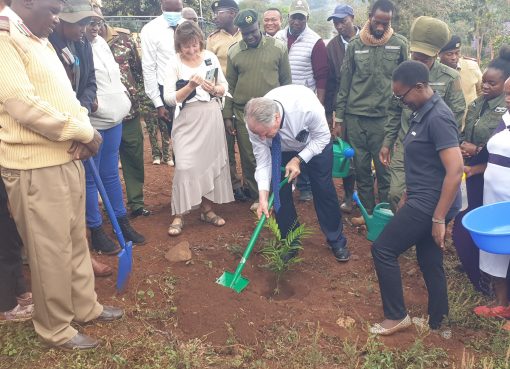The County Government of Nakuru has warned travelers, particularly those on long-distance journeys against littering highways with single use plastics.
According to Chief Officer Directorate of Environment, Energy, Natural Resources and Climate Change Muriithi Kiogora, private motorists are the major contributors to environmental pollution along the highway.
“A significant proportion of individuals discarding the single use plastic waste along our highways are literate people who understand well the impact of environmental pollution, most of them being private motorists. We will be conducting impromptu highway inspections and those found littering will be charged as per the provisions of the Nakuru County waste management Act 2021 and other relevant laws,” said Mr Kiogora.
The Chief Officer has further revealed that some traders are flirting with jail terms and heavy fines by secretly stocking and selling plastic flat bags that were banned in August 2017.
The traders, he warned risk four years in jail or Sh4 million in fines should they be arrested and convicted.
Speaking after the Directorate conducted a clean-up exercise along the Nakuru-Nairobi highway following a mass dumping of plastic waste by unknown culprits, Kiogora indicated that the devolved unit has about 160 kilometres of the national highway passing through thus making it prone to careless disposal of waste.
The Chief Officer stated that the single use plastics that littered the highways included food packaging materials, grocery bags, bottles, straws, containers, cups and cutlery.
He expressed concern that at least 30 to 40 tonnes of single use plastic containers find way into Lake Nakuru National Park every rainy season, posing danger to the wildlife and are a threat to one of Kenya’s most visited parks.
“Nakuru has a delicate ecosystem because it is home to a large population of wild animals and it hosts lakes like Elementaita and Nakuru which are not far from the highway. Other water bodies whose ecosystem is increasingly being threatened by the plastic waste menace are Lakes Naivasha and Rivers Njoro, Ndarugu, Ngosur and Molo,” explained Kiogora.
He noted that the Directorate is exploring ways of roping in all stakeholders who include the National Environment Management Authority (NEMA), National Police Service, and National Transport and Safety Authority (NTSA) so as to find a permanent solution to the problem.
“We want to ensure that all road users are responsible for their waste and they will only dispose of it at designated places. Plastics don’t biodegrade. They remain in the soil or in water for hundreds, perhaps thousands of years. They release toxins into the environment, continuing to hurt life systems long after they become useless,” said Kiogora.
Kiogora observed that it was high time for Kenyans to begin a national conversation on the need to cut consumption of certain plastic products and increase the reusability of others as well as substituting certain plastics with other materials where this can be done in an environmentally sound manner.
He indicated that one way of reducing plastic waste is by introducing circularity; that all forms of waste are returned to the economy or used more efficiently.
A circular economy added the Director is restorative and regenerative by design and calls for innovation to ensure that plastics are reusable, recyclable, or compostable.
Kiogora observed that though Kenya banned single-use plastics in conservation areas including national parks and reserves two years ago dumping was still occurring in protected areas.
“When it rains, flood water carries tonnes of plastic waste into Lake Nakuru and thereby killing it slowly. There is a growing need to move away from single-use plastics and the throw-away culture imagining waste can magically disappear,” he said, adding that every week over 500 kilogrammes of plastic are collected from the park.
In its infrastructure spatial plan for Lake Nakuru National Park, the Kenya Wildlife Service (KWS) laments that it was now diverting resources that are meant for other purposes into retrieving single use plastics from Lake Nakuru and River Ndarugu.
The service (KWS) has challenged the County government to take drastic measures to curb the plastics menace which was harming animal and aquatic life.
“If this continues unchecked, the lake will eventually be too toxic for the current aquatic life as well as herbivores that often come into contact with non-biodegradable material leading to their deaths.
Uncoordinated plastic waste management system has exposed wildlife to toxic metals and harmful bacteria which has decimated populations of various species of animals at the wildlife facility,” reads part of infrastructure spatial plan report.
Christine Wangari, the Executive Director to Multi-Touch International, an environmental Conservation nongovernmental organization underscored the need for businesses to urgently and concretely avoid false solutions by investing in reusable and new product delivery models that promote plastic-free systems and protect our oceans, people and livelihoods.
“Manufacturing entities and organizations need to reorient their focus on phasing out single-use plastics. It is urgent. Perhaps ways should be explored by national and county governments to promote and incentivize businesses that are increasingly eliminating the use of plastics in operations,” suggested Wangari.
Such businesses stated the Executive director may include those that bring local, fresh food to people without plastic packaging, encourage deposit refunds for bottles and have refill systems such as milk ATMs.
African governments, she affirmed, must restrict the types and quality of packaging through legislation such as bans to accelerate the transition to a plastic-free future.
The environmentalist indicates that she is engaging a section of members of parliament to draft legislation to ban the single-use of single use bottles, plastic straws, cutlery, and cups that are choking waterways in the country.
Wangari said the ultimate source of the problem – Kenyan’s ‘newfound’ dependence on throwaway plastic products should be tackled through total ban on single use plastic containers.
“Single use plastic bottles are now a major cause of pollution and reduce the habitats. We have come across animals entangled with these bottles. If ingested by the wildlife, they end up dying and pull back our efforts on conservation. We must ban plastic bottles and give another industry an opportunity to fill the gap created,” she affirmed.
The Executive Director noted that various laboratory analyses sponsored by government agencies, educational institutions and researches have confirmed that a significant proportion of the plastic containers retrieved from waterways contained chemical traces which in turn endanger marine life and wild animals.
By Anne Mwale and Rita Soila





